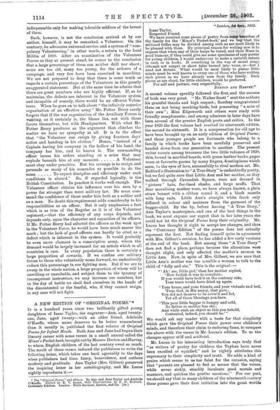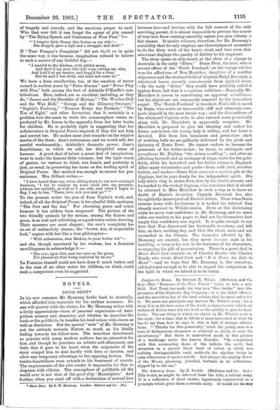A NEW EDITION OF " ORIGINAL POEMS."*
IT is a hundred years since two brilliantly gifted young daughters of Isaac Taylor•, the engraver•—Ann, aged twenty- one, Jane, aged twenty—with an older friend, Adelaide OICeeffe, whose name deserves to be better• remembered than it usually is, published the first volume of Original Poems for Infant Minds. Both Ann and Jane had begun their literary career with some verses in a small annual called the Minor's Pocket-book, brought out by Messrs. Darton and Harvey, to whom English children of the last century owed so much. The merit of these verses induced the publishers to write the following letter, which takes one back agreeably to the days when publishers had time, fancy, benevolence, and authors modesty and gratitude. Ann Taylor (Mrs. Gilbert) preserved the inspiring letter in her autobiography, and Mr. Lucas rightly reproduces it:—
• The " Original Poems" and Others. By Ann and Jane Taylor and Adelaide O'Keelfe. Edited by E. V. Lucas, with Illustrations by F. D. Bedford. Centenary Edition. London : Wells Gardner, Darton, and Co. [fel
".London, 1st 6mo., 1803. Isaac Taylor,
Respected Friend.
We have received some pieces of poetry from some branches of thy family for the Minor's Pocket-book,' and we beg that the enclosed trifles may be divided among such as•are most likely to be pleased with them. My principal reason for writing now is to request that when any of their harps be tuned, and their Muse in good humour, if they could give me some specimens of easy poetry for young children, I would endeavour to make a suitable return in cash or in books. If something in the way of moral songs (though not songs) or short tales turned into verse, or—but I need not dictate. What would be most likely to please little minds must be well known to every one of those who have written such pieces as we have already seen from thy family. Such pieces as are short, for little children, would be preferred.
For self and partner, very respectfully,
DABTON AND HARVEY."
A second volume speedily followed the first, and the success of both was very great. " Mr. Walter Scott " sent the authors his grateful thanks and high respect; Southey congratulated them on not being mocking-birds, but possessing " a note of their own" ; Miss Edgeworth and others were ready with friendly compliments ; and among admirers in later days have been several of the greater English poets and critics. In the year 1820 the first volume had reached its nineteenth edition, the second its sixteenth. It is a compensation for old age to have been brought up on an early edition of Original Poems; and those younger people are fortunate who belong to a family in which books have been carefully preserved and handed down from one generation to another. The present writer counts among treasures the two little volumes of 1820,
thin, bound in marbled boards, with green leather backs, pages worn at favourite poems by many fingers, frontispieces which seem, to the eyes of love, successfully to rival modern art. Mr. Bedford's illustration to "A True Story" is undoubtedly pretty, but we feel quite sure that Little Ann and her mother, as they walked through Cavendish Square, were not dressed in " picture " bats, fur-lined cloaks, and large muffs. That dear moralising mother wore, we have always known, a plain straw bonnet with a ribbon round it, and a black mantle with long ends. Little Ann's straight white frock only differed in colour and neatness from the garment of the beggar-child. By the by, before leaving "A True Story,"
Ann Taylor's masterpiece, and one of the best things in the book, we must express our regret that in her later years she could not let the Original Poems keep their originality. Mr. Lucas has thought it right to accept her changes, and thus the " Centenary Edition " of the poems does not actually represent the first. Not finding himself quite in agreement with Mrs. Gilbert's revision, he has added a few early versions at the end of the book. But among these "A True Story" does not find a place, perhaps because the alterations were thought slight, and only affected the mother's sermon to Little Ann. Now, in spite of Mrs. Gilbert, we are sure that Little Ann's mother was too sensible a woman to talk to the child of "folly and sin." This is the original :- "' Ah ! see, little girl,' then her mother replied, `How foolish it was to complain;
If you would have look'd on the contrary side, Your tears would have dried up again.
Your house, and your friends, and your victuals and bed, 'Twas God, in His mercy, that gave ; You did not deserve to be cover'd and fed, Yet all of these blessings you have.
`This poor little beggar is hungry and cold, No father or mother has she;
And while such an object as this you behold, Contented, indeed, you should be.'" We would ask any reader with a taste for that simplicity which gave the Original Poems their power' over children's
minds, and therefore their claim to enduring fame, to compare the above with the verses in Mr•. Lucas's edition. To us the changes appear stiff and artificial.
Mr. Lucas in his interesting introduction says truly that "as writers of poetry for children the Taylors have never been excelled or equalled," and he rightly attributes this supremacy to their simplicity and truth. He adds a kind of praise which seems to us too faint for the occasion, saying that " parents are pleased to feel so secure that the verses, while never sickly, steadily inculcate good morals and manners, and quicken the gentler emotions." For our part, we should say that to many children of the nineteenth century these poems gave their first initiation into the great worlds
of tragedy and comedy, and the emotions proper to each. Who that ever felt it can forget the agony of pity caused by " The Dying Speech and Confession of Poor Puss " P-
"‘ I forgive little Fanny this bruise on my side '— She stopp'd, gave a sigh and a struggle, and died "
If ".Poor Pompey's Complaint" did not thrill us in quite
the same way, it was because imagination refused to believe in such a master of any faithful dog:- " I crawl'd to the kitchen, with pitiful moan, And show'd my poor ribs that were cutting my skin, And look'd at my master, and begg'd for a bone,
But he said I was dirty, and must not come in !"
We have a keen recollection, too, of the emotion of terror caused in earliest years by " False Alarms " and " Never Play
with Fire," both among the best of Adelaide O'Keeffe's con- tributions. Hers, indeed, are so excellent, including, as they do, "James and the Shoulder of Mutton," " The Wooden Doll and the Wax Doll," " George and the Chimney-Sweeper," " Sophia's Foolscap," " Frances Keeps her Promise," " The
Use of Sight," and other favourites, that it certainly is a problem how she came to write the commonplace verses re- produced by Mr. Lucas in the appendix from her later books for children. He is probably right in suggesting that her collaborators in Original Poems inspired, if they did not help and correct her. He makes some just remarks on the relative
merits of the three : Ann's seriousness, and we would add, her careful workmanship ; Adelaide's dramatic power; Jane's fancifulness, to which we add, her delightful sense of humour. A great deal of talent, a great deal of imagination, went to make the famous little volumes ; but the light touch
of genius, we venture to think, was Jane's, and posterity is just, as usual, in preserving her name as the leading spirit of Original Poems. Her method was enough to ensure her pre- eminence. Mrs. Gilbert writes :- " I have heard Jane say, when sitting down to our new evening's business, try to conjure up some child into my presence, address her suitably, as well as I am able, and when I begin to flag, I say to her, " There, love, now you may go.°"" To the present writer the gem of Jane Taylor's work, and, indeed, of all the Original Poems, is her playful little apologue, " The Cow and the Ass." For charming grace and comic humour it has seldom been surpassed. The picture of the two friendly animals by the stream, among the daisies and grass, is as cool and refreshing as a good water-colour drawing. Their manners are most elegant ; the cow's complaint has an air of melancholy reason; the "brown Ass, of respectable look," argues with her like a true philosopher- " With submission, dear Madam, to your better wit "- and she, though convinced by his wisdom, has a feminine unwillingness to acknowledge it:— "The cow, upon this, cast her eyes on the grass, Not pleased-at thus being reproved by an ass."
La Fontaine himself could not have done it much better, and in the case of no other writer for children, we think, could such a. comparison even be suggested.







































 Previous page
Previous page